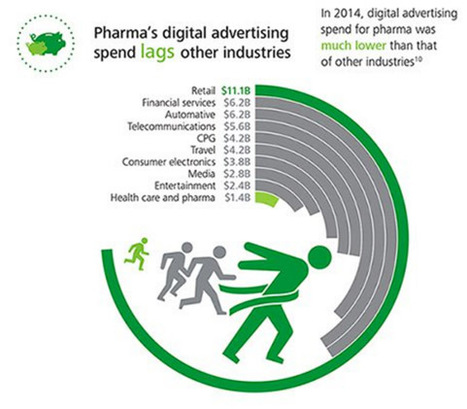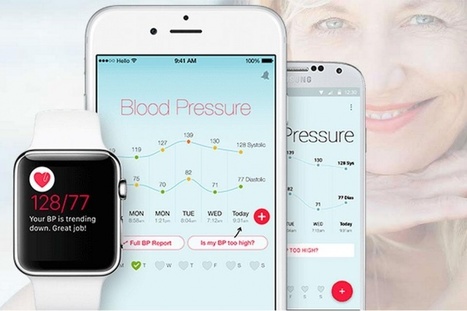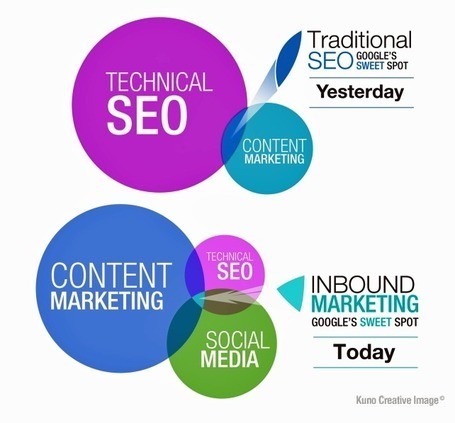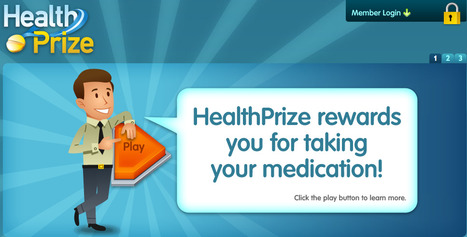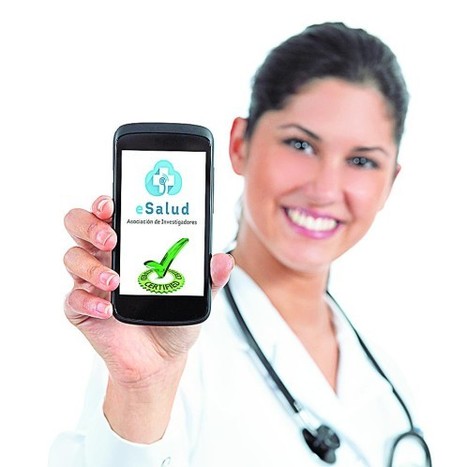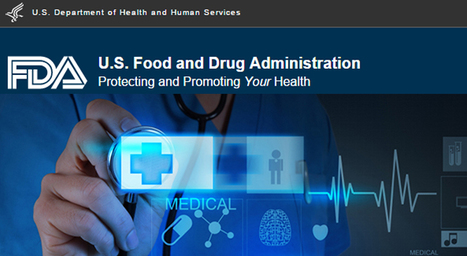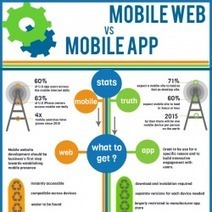 Your new post is loading...
 Your new post is loading...
New communications technology has the potential to both disrupt and enhance the pharmaceutical industry, but research shows that pharma often needs to up its game when it comes to the adoption of new technologies. Mobile devices have transformed how we access and consume content, and are poised to make similarly huge changes to the way consider our health (read “The mHealth App Market is at the Saturation Point”; http://sco.lt/5thWGv). mHealth revenue is projected to reach 26 billion by 2017, and the number of health apps has doubled in just the past two years. Social is also likely to have a major impact in the way that pharma communicates in the coming years. 52% of physician’s surveyed by Deloitte in this research expressed interest in communicating with pharma companies via social media. However, pharma currently lags behind other verticals for using social media. Pharma spending on digital advertising is far below that of other industries, and it still conducts most of it’s communications with physicians via traditional channels. There is big potential for new communications technology to make the pharmaceutical industry more efficient and more engaged with it’s customers. This infographic from Deloitte shows the potential for new digital technology to allow pharma to market itself more effectively.
Via Pharma Guy, Lionel Reichardt / le Pharmageek
Minority of Apps Appear Likely to be Useful in Engaging Patients [Current pharma apps are at the bottom of this pyramid. As you move up the pyramid, pharma would have a more difficult task to develop useful engaging apps for patients.]
A systematic search of the iOS and Android app stores for a broad set of medical conditions revealed 946 iOS apps and 1,173 Android apps. After removing non-health-care, non-patient-facing, non-English, and highly similar apps, 376 iOS apps and 569 Android apps remained (Exhibit 2).
Of the 376 iOS apps:
- 24 (6%) appeared to have limited engagement beyond traditional media
- 66 (18%) were not relevant to the search condition
- 33 (9%) had poor ratings or reviews, 63 (17%) were last updated prior to 2014
- 29 (8%) were otherwise not assessed to be useful.
Of the 569 Android apps:
- 89 (16%) had limited engagement
- 56 (10%) were not relevant to the search condition
- 8 (1%) had poor ratings or reviews, 200 (35%) were last updated prior to 2014
- 64 (11%) were otherwise not assessed to be useful.
In all, 161 (43%) iOS apps and 152 (27%) Android apps were assessed as possibly useful, of which 126 apps existed on both platforms.
Via Pharma Guy
A new study released by mobile engagement provider Mobiquityexposes the “gap between patients’ demand for taking control of their own health and the accessibility or availability of digital and mobile tools when it comes to the management of chronic health conditions.”
The study revealed that one third of patients with chronic diseases don’t currently use mobile apps to manage their conditions, but would like to start.
In fact, the report summary notes, one in four respondents feel that “wearable devices are the way of the future.”
Interestingly, almost 50 percent of patients believe they should bring information/digital tools to their doctor – rather than the other way around – reinforcing their desire to be actively involved in managing their health rather than trust their doctors to exclusively manage it. When asked about the most challenging aspects of managing their conditions, 26 percent of respondents agree that finding direct means of communicating with health professionals presents the biggest hurdle. Other top challenges include:
- Monitoring changes in health (25%)
- Remembering to take medication (20%)
- Keeping up to date with medical advancements, treatments, etc. (18%)
“It’s clear the potential for digital solutions is vast: 40 percent of respondents feel mobile tools play an important role in overall healthcare,” the report summary reads.
Via Pharma Guy
.Si tienes un historial de enfermedades del corazón o estás en riesgo de problemas relacionados con el corazón, entonces estás, probablemente, controlando ya tu presión arterial. En lugar de anotar los resultados en un pedazo de papel, es posible que desee probar Hola corazón para iOS y Android. Hola Corazón ofrece explicaciones en tiempo real de lo que significan las lecturas de la presión arterial, y te explica cómo lo estás haciendo en general. Recibirás informes semanales de PRESIÓN ARTERIAL para ver las tendencias y obtener recordatorios para ver tus niveles de presión o tomar tus píldoras, de modo que puedas tomar control de tu salud.
Leer más en
http://www.digitaltrends.com/mobile/hello-heart-app-ios-androi
Via Ignacio Fernández Alberti
Aplicaciones para mejorar la salud | salud Activa | La Vanguardia
L’Office des télécommunications éducatives de langue française de l’Ontario (Canada) et sa chaine TV éducative et culturellepublique TFO ont inauguré le 21 avril 2014 le site Web Edululu.org, portail de référence qui note et classifie des applications éducatives francophones pour les jeunes de 2 à 17 ans. Près de 300 applications y sont déjà sélectionnées et 1100 applis y figureront d’ici la fin de l’année. Il s’agit du« premier service public d’évaluation d’applications éducatives indépendant au Canada ».
Via Frédéric DEBAILLEUL, Bruno De Lièvre, Gilles Le Page, nathalie Bissot-Campos
7 Mobile SEO Mistakes To Avoid
Details of three new gamified health products: Cellnovo – a gamified diabetes tracking package with a mobile handset, web app, and insulin pump HealthPrize – a medicine adherence application that rewards you for taking your medicine Hubbub Health – a social health network that combines gaming, daily challenges, and a community to promote physical and mental wellness
Via Thomas N. Burg, Dimitra Kontochristou
“I don’t see why anybody wants ‘em!. . ./They are just impossible to control!?What’s the matter with. . . .mobile health apps??. . . today?” When it isn’t Dick V...
Via Thomas N. Burg, RFinkel
|
The results of this year’s mHealth App Developer Economics 2016 study show a steep increase in competition level among mHealth app publishers. The supply side of mHealth apps is measured in the number of available apps and publishers. They are growing significantly faster than the demand side which is quantified by the number of mHealth app downloads. The number of mHealth apps and active mHealth app publishers has seen strong growth since 2015. This year, the total number of mHealth apps listed on major app stores across the globe grew by 57% to 259,000 apps. This impressive growth is based on three main developments; the growing number of mHealth app publishers, the increased importance of multi-platform app publishing and the expansion of existing mHealth app portfolios. The number of mHealth app publishers grew in line with the number of apps. There are currently 58,000 mHealth app publishers app on major app stores, 28% more since the beginning of 2015. There appears to be no immediate end to the number of companies rushing into the market to launch their first mHealth app. In contrast, growth rates of mHealth app store downloads are estimated to be only +7% in 2016, having been +35% the previous year, reaching a total of 3.2B in 2016. This is in line with other app market categories and reflects the fact that growth of capable devices that can download apps has slowed down in most western countries. As a consequence of this increased competition, it will be even more difficult to stand out and gain significant downloads. Only 14% of mHealth app publishers generated more than 100,000 downloads with their mHealth app portfolio in one year. With hundreds of new mHealth apps released daily, companies have to consider their app launch as if it were a familiar product in a saturated market.
Via Pharma Guy
The number of mobile health applications (mHealth apps) available to consumers now surpasses 165,000 (here). One-fifth of smartphone owners had health apps in 2012, and 7% of primary care physicians recommended a health app.
The FDA has even approved the prescribing of mHealth such as the DiabetesManager System, which captures, stores and transmits blood glucose levels.
Unfortunately, many health apps do not have privacy policies informing users of how personal health data is collected, stored, transmitted, and shared with third parties. Even when there are privacy policies, many health apps do not fully inform patients of how their data will be used or shared.
In a study appearing in the March 8 issue of JAMA, Sarah R. Blenner, J.D., M.P.H., of the Illinois Institute of Technology Chicago-Kent College of Law, Chicago, and colleagues examined the privacy policies of Android diabetes apps and the sharing of health information. They found that 81% of the apps did not have privacy policies. Of the apps with privacy policies, only 4 said they would ask users for permission to share data. Read more details here.
Via Pharma Guy
El número de aplicaciones de salud disponible para los consumidores supera ya los 165.000, según un estudio publicado este mes por el IMS Institute for Healthcare Informatics. Tan sólo en el sistema operativo de Apple (iOS) la cifra se ha duplicado desde 2013. La funcionalidad de la mitad de ellas es limitada: apenas se limitan a facilitar información. Sólo un dos por ciento se conecta con el sistema encargado de proporcionar asistencia sanitaria. Esto repercute en las descargas: 36 apps acumulan casi la mitad de ellas, mientras que el 40 por ciento tienen menos de 5.000. Leer en la razón http://www.larazon.es/atusalud/ciencia/apps-de-salud-wcomo-fiarse-AL10824501#.Ttt115nsFEA04qF
Via Ignacio Fernández Alberti, ChemaCepeda
Todavía no existe en ningún bloque ni país del mundo una regulación legislativa sobre lasaplicaciones móviles destinadas a la salud de los usuarios, pues el abordaje excede las normas vigentes. Ante este vacío legal, la Food and Drug Administration (FDA) ha publicado una guía de recomendaciones a tener en cuenta por desarrolladores, distribuidores y entidades que trabajen en la construcción de estas herramientas mHealth. El objetivo del organismo es aplicar su autoridad regulatoria en aras de realizar una selección de softwares pensados para dispositivos móviles. Pero el documento no establece obligaciones legales ni normativas, sino que sugiere los aspectos a los que la industria debe prestarles especial atención antes de desarrollar o comercializar estas tecnologías. De hecho, la publicación hace énfasis en aquellas apps pensadas para trabajar como dispositivos médicos que pueden llegar a exponer al paciente a ciertos riesgos. Para entrar en esta definición, las app deben cumplir algunas funciones: • Proveer herramientas para organizar o hacer un seguimiento de datos sobre el estado de salud de los usuarios. • Ofrecer información amigable sobre tratamientos y enfermedades relacionadas. • Documentar o comunicar condiciones médicas potenciales. • Permitir que los usuarios interactúen con sistemas de historia clínica electrónica. • Transferir, almacenar, traducir o enviar datos de un dispositivo médico externo. • Realizar cálculos rutinarios de la práctica médica automáticamente. Podeis leer el articulo completo en E-health Reporter en http://www.ehealthreporter.com/es/noticia/verNoticia/3818/la-fda-publico-una-guia-para-evaluar-apps-de-salud
Via Ignacio Fernández Alberti
Venture investor Chris Dixon of Andreessen Horowitz and others say they are concerned that the increasing use of mobile apps means less investment in the open web, and that this could have a negative effect on innovation. But is that true?
Via jean lievens
It is crucial for businesses of all sizes to establish their mobile presence, but with the mobile landscape transforming so rapidly, it is not always
Clinical Guidelines is a useful app for healthcare professionals who want a relatively complete set of guidelines from a range of sources. It completes this function effectively through use of a robust search function and clear layout.
Via Thomas N. Burg
|



 Your new post is loading...
Your new post is loading...

